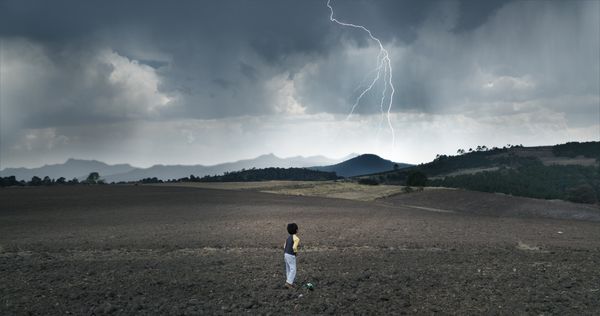 |
| The Echo |
Salvadoran Mexican filmmaker Tatiana Huezo's The Echo (El Eco), a documentary that leans into the language of fiction, centres on three rural families. As in her previous film, Prayers For The Stolen (Noche De Fuego), the focus is on children. However, the image of young people caught up in the violence of the Mexican cartels contrasts with The Echo's gentle and rhythmic tapestry of emotions and day-to-day experiences in the Mexican countryside.
The Echo represents a departure for Huezo, from the dark subjects that have defined her feature documentaries. Alongside Prayers For The Stolen, she has documented the victimisation of women in Tempestad and the impact of a civil war on a small town in El Lugar Más Pequeño.
In conversation with Eye For Film, Huezo discussed her fascination with childhood, bringing the urban playground to the countryside and playing the role of provocateur.
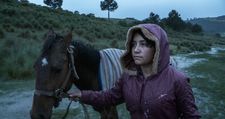 |
| The Echo |
Paul Risker: Why filmmaking as a means of creative expression? Was there an inspirational or defining moment?
Tatiana Huezo: I fell in love with cinema in the Mexican cinematheque when I was about ten-years-old. My mum didn't have anyone to leave my sister and I with, so she would take us to the cinema. I'd watch films by [Rainer Werner] Fassbinder, [David] Lynch, [Wim] Wenders and [François] Truffaut that I wasn't supposed to be watching at that age. Films like Blue Velvet, Alice In The Cities and Eraserhead. I had nightmares about those films and an incredible fascination for the atmospheres they created.
It was like looking through the window of dreams. I felt it so intensely that it was almost too much. At that age, I thought the people who made films had a lot of power because they could make you live the life of other people. I really wanted to learn to do that [laughs], so that was the seed.
I would always write stories, but I really wanted to make films when I was growing up. I wasn't interested in studying anything else. But it's also to do with the kind of life each of us has. When I was very little, I grew up in the countryside with sheep and animals. We didn't have a television; my mum was always travelling because of work and perhaps my sister and I had too much freedom when we were little, and that's one of the reasons I ended up making films.
PR: As a filmmaker, having encountered struggles and compromises, do you still think filmmakers possess this power?
TH: Not exactly or maybe not so much the filmmakers, but the cinema has the power to lead you on a journey into a sensory world, which fascinates me. I'm seduced by the idea of structuring my films from an immersive point of view, with immersive sound and [a broader] aesthetic. Sound is a very powerful tool to get you involved and make you feel things that you cannot explain.
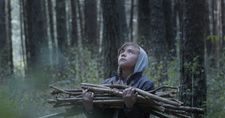 |
| The Echo |
PR: Sound is important in The Echo because it gives the rural space an authenticity.
TH: Absolutely. This film has a very powerful sound design and the sound is highlighted - it's not only how things sound. I've been working with Lena Esquenazi, the sound engineer, for 20 years, and we enjoy working together in this way.
When I was in the forest making The Echo, I could hear the branches crunching and the other sounds. I closed my eyes, and I would think, "This needs to go in the film," but the sound wasn't enough.
It's impossible to get the sound of the branches because they're usually really high up, so it's about reconstructing those sounds with external elements in order to achieve the effect and make it more present. So, when we were in the studio, I would tell Lena to listen carefully to how this sounds, to close her eyes because it's like a loud metallic noise - the creaking of the playground's swings and chains.
I added a lot of other elements to enhance all the different noises and sounds. For instance, this film is about wind and the sound of it had to roar. […] It's also the case with the sounds of the animals, which was enhanced because I wanted to humanise them and have them be closer to the human characters. And of course, that applies to the image.
PR: What compelled you to believe in this film and decide to tell this story at this particular point in time?
TH: I decided to make this film because I wanted to explore the world of childhood, and what happens at that moment in time. It's a moment where there is warmth, curiosity and a child will always dare to ask, why? But there's also that moment when we get those personal traits that will mark us for the rest of our lives.
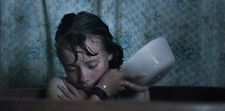 |
| The Echo |
It also has to do with me raising a daughter who will soon stop being a child and become an adolescent. I wanted to capture the pulse of life at that moment, and I felt nostalgic about it throughout the process. I really wanted to make a film that would get away from the painful wounds that define my others. My soul needed a rest and I wanted to make a lighter film, but one that would also speak about Mexico from the point of view of rural life.
PR: I believe the Swiss psychoanalyst CG Jung said, when we're young, we learn about the world around us and when we're adults, we learn about ourselves.
TH: It's a film that speaks about the meaning of growing up. The scene of the little girl with her eyes covered, playing catch, is subjective and full of symbolic images. I used to call that sequence "touching the void" [laughs] because when you're a child, you can't see what's in front of you, or what's to come. There are those moments in which you simply don't understand the moment or world you're living in, but then you can hug a tree and feel a very intense feeling and heal. At that moment in life, we believe everything is possible.
PR: The challenge with The Echo is you can't explain to the audience. Instead, you have to show them and hope they understand. If they don't, then you have to accept this because to explain is to undermine your intentions.
TH: I completely agree. The film speaks about childhood, but it also speaks about all the small details of daily life. My objective, and the biggest challenge, was exactly that, and I'm not going to explain. I just want to open a window, so the audience can immerse themselves in the universe of this community and connect with these children in an emotional way during this short period of their lives.
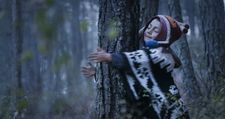 |
| The Echo |
There are no interviews or voiceover - that was decided in the beginning. The challenge for me and the DOP [Ernesto Pardo] was to look at life to see if we could grab a little bit of it with all its purity. That's the reason why The Echo is completely different to the rest of my films, because the challenge was to also use a language that was closer to fiction. The framing of the camera was done in this way, but it wasn't with the expectation for the children to act or to tell them what to say.
The dialogue in this film is some of the best I've written, because all the situations belong completely to the people onscreen. After four years of doing research where I learned about their lives, sleeping in their houses and seeing Luz Maria's parents argue many times, I provoked certain conversations amongst them.
The argument the couple have at the table in the film is a very intimate moment. We were having dinner and I told them we were going to be in that corner filming and all I ask you to do is speak about something you do not agree about, and you don't like about your life as a couple. The conversation in the film was longer, and I had to edit it down, but that was how I'd get them to talk about something while still being themselves.
The Echo is released theatrically in the UK on Friday 26 July by New Wave Films.





















